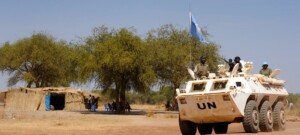UN OCHA: 349,000 people affected by recent floods in Sudan
Heavy rains and flash floods have affected nearly 349,000 people across Sudan as of 22 September, according to the report published today by the UN Office for the Coordination of Humanitarian Affairs (OCHA) in Sudan.
 Traveling during rainy season in Sudan (file photo)
Traveling during rainy season in Sudan (file photo)
Heavy rains and flash floods have affected nearly 349,000 people across Sudan as of 22 September, according to the report published today by the UN Office for the Coordination of Humanitarian Affairs (OCHA) in Sudan.
Rains and floods have “destroyed at least 24,800 homes and damaged another 48,200 in 16 out of the 18 states”, the report said.
The National Council for Civil Defence reported that 146 people have died as a result of the floods, and more than 122 people injured since the start of the rainy season in June.
Among the most affected states are South Darfur, White Nile, Kassala, Central Darfur and, Gedaref.
Poor infrastructure in these regions, especially inadequate road access to hard-to-reach areas, have severely been hampered by the flooding, which in turn has impacted the timely delivery of nutrition services, according to OCHA.
The floods have also completely destroyed 125 schools and damaged 272 schools, which has affected over 140,000 children. OCHA has also stated that an additional 241 schools have reportedly been affected, with the figure currently being verified by them.
OCHA have reported that classroom rehabilitation will be required to repair the flood damage, in order to “ensure children are able to access safe school environments conducive to learning”.
According to the UN organisation’s report, “urgent funds are needed to meet these needs of more than 125,000 school children who will require assistance to return to school at the start of the 2022-2023 academic year”.
Gender-based violence
OCHA’s report also stated that 5,650 dignity kits were distributed across most affected states. Among other items, these kits usually contain essentials such as menstrual pads, bath soap, multiple pairs of underwear, and sanitary napkins.
According to the report, 115 social workers and counsellors were deployed to provide quality psychosocial services and referral services in Central, South, North, and West Darfur, South Kordofan, Gedaref, Kassala, Blue Nile and White Nile states.
Lifesaving health services such as clinical management of rape were provided also provided in the aforementioned states in Sudan. However, according to the organisation there is a critical shortage of Rape Treatment Kits and limited safe spaces for women and girls that can provide gender-based violence services.
Water sanitation and hygiene
OCHA reported that in Gedaref state, UNICEF, International Organization for Migration, and the Norwegian Refugee Council distributed water, sanitation and hygiene for 6,000 people affected by floods.
This included 12,000 bars of soap, 585 hygiene kits, 25,000 strips of chlorine tablets, and 1,170 jerry cans, according to the report.
In South Darfur sate, “more than 640,000 chlorine tablets were distributed and around 500 collapsed latrines were disinfected, treated and replaced”, the report stated.
Despite this, disease outbreaks present a high risk, particularly in high concentration areas.
OHCHA highlighted that water and sanitation are priority needs, especially for those who have been displaced by flooding. However, there is limited capacity and resources for response.











 and then
and then